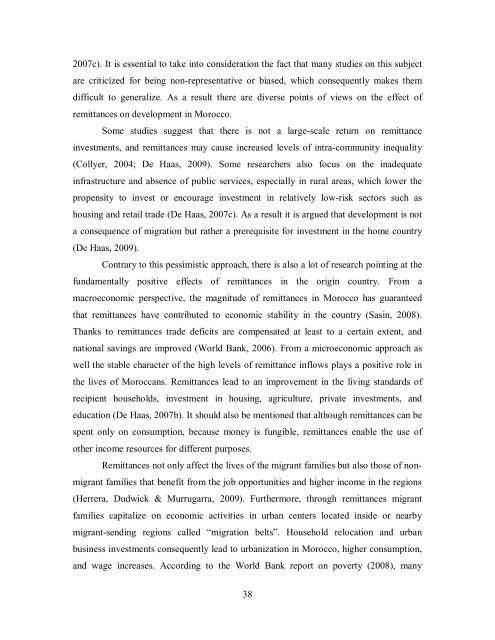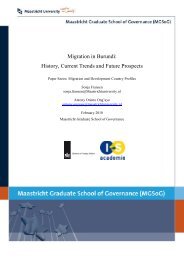Migration in Morocco: History, Current Trends and Future ... - MGSoG
Migration in Morocco: History, Current Trends and Future ... - MGSoG
Migration in Morocco: History, Current Trends and Future ... - MGSoG
You also want an ePaper? Increase the reach of your titles
YUMPU automatically turns print PDFs into web optimized ePapers that Google loves.
2007c). It is essential to take <strong>in</strong>to consideration the fact that many studies on this subject<br />
are criticized for be<strong>in</strong>g non-representative or biased, which consequently makes them<br />
difficult to generalize. As a result there are diverse po<strong>in</strong>ts of views on the effect of<br />
remittances on development <strong>in</strong> <strong>Morocco</strong>.<br />
Some studies suggest that there is not a large-scale return on remittance<br />
<strong>in</strong>vestments, <strong>and</strong> remittances may cause <strong>in</strong>creased levels of <strong>in</strong>tra-community <strong>in</strong>equality<br />
(Collyer, 2004; De Haas, 2009). Some researchers also focus on the <strong>in</strong>adequate<br />
<strong>in</strong>frastructure <strong>and</strong> absence of public services, especially <strong>in</strong> rural areas, which lower the<br />
propensity to <strong>in</strong>vest or encourage <strong>in</strong>vestment <strong>in</strong> relatively low-risk sectors such as<br />
hous<strong>in</strong>g <strong>and</strong> retail trade (De Haas, 2007c). As a result it is argued that development is not<br />
a consequence of migration but rather a prerequisite for <strong>in</strong>vestment <strong>in</strong> the home country<br />
(De Haas, 2009).<br />
Contrary to this pessimistic approach, there is also a lot of research po<strong>in</strong>t<strong>in</strong>g at the<br />
fundamentally positive effects of remittances <strong>in</strong> the orig<strong>in</strong> country. From a<br />
macroeconomic perspective, the magnitude of remittances <strong>in</strong> <strong>Morocco</strong> has guaranteed<br />
that remittances have contributed to economic stability <strong>in</strong> the country (Sas<strong>in</strong>, 2008).<br />
Thanks to remittances trade deficits are compensated at least to a certa<strong>in</strong> extent, <strong>and</strong><br />
national sav<strong>in</strong>gs are improved (World Bank, 2006). From a microeconomic approach as<br />
well the stable character of the high levels of remittance <strong>in</strong>flows plays a positive role <strong>in</strong><br />
the lives of Moroccans. Remittances lead to an improvement <strong>in</strong> the liv<strong>in</strong>g st<strong>and</strong>ards of<br />
recipient households, <strong>in</strong>vestment <strong>in</strong> hous<strong>in</strong>g, agriculture, private <strong>in</strong>vestments, <strong>and</strong><br />
education (De Haas, 2007b). It should also be mentioned that although remittances can be<br />
spent only on consumption, because money is fungible, remittances enable the use of<br />
other <strong>in</strong>come resources for different purposes.<br />
Remittances not only affect the lives of the migrant families but also those of non-<br />
migrant families that benefit from the job opportunities <strong>and</strong> higher <strong>in</strong>come <strong>in</strong> the regions<br />
(Herrera, Dudwick & Murrugarra, 2009). Furthermore, through remittances migrant<br />
families capitalize on economic activities <strong>in</strong> urban centers located <strong>in</strong>side or nearby<br />
migrant-send<strong>in</strong>g regions called “migration belts”. Household relocation <strong>and</strong> urban<br />
bus<strong>in</strong>ess <strong>in</strong>vestments consequently lead to urbanization <strong>in</strong> <strong>Morocco</strong>, higher consumption,<br />
<strong>and</strong> wage <strong>in</strong>creases. Accord<strong>in</strong>g to the World Bank report on poverty (2008), many<br />
38



